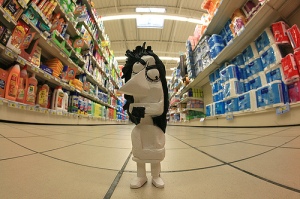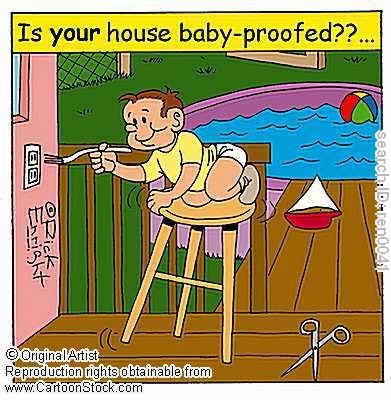 Teaching students to think for themselves has been a major challenge for educators throughout history. The reason why the challenge exists is because it takes extra effort to think. Students often complain, “but Miss, can’t you just tell us the answer, why do we have to work it out when you already know what it is?” In one sense this is a legitimate complaint especially if the learning is pointless, disconnected and irrelevant. The students feel that they are playing a guessing game to learn the ‘truth’ rather than constructing their own knowledge. Curriculum must first be relevant and ‘important’ and students must be able to see the point of engaging with learning. It is our job as professionals to be able to explain to students why the learning is essential. If we can’t answer the question, ‘why?’ then perhaps the learning isn’t justifiable. Unfortunately, ‘because I said so.’ doesn’t cut it in today’s learning environments. Students are given more choice from an increasingly early age and since they have more disposable income than their parents they are also able to consume from an early age. Time poor parents give choices as a way to avoid having an argument when they are low on energy and this means that the current generation of students is used to deciding for themselves. It is interesting therefore that they don’t naturally want to think for themselves. It is through teachers posing challenges, problematising learning and giving students agency that young people will engage with learning. But teaching professionals also need to be prepared to justify the learning not only to school boards and the education department but to the students they will teach.
Teaching students to think for themselves has been a major challenge for educators throughout history. The reason why the challenge exists is because it takes extra effort to think. Students often complain, “but Miss, can’t you just tell us the answer, why do we have to work it out when you already know what it is?” In one sense this is a legitimate complaint especially if the learning is pointless, disconnected and irrelevant. The students feel that they are playing a guessing game to learn the ‘truth’ rather than constructing their own knowledge. Curriculum must first be relevant and ‘important’ and students must be able to see the point of engaging with learning. It is our job as professionals to be able to explain to students why the learning is essential. If we can’t answer the question, ‘why?’ then perhaps the learning isn’t justifiable. Unfortunately, ‘because I said so.’ doesn’t cut it in today’s learning environments. Students are given more choice from an increasingly early age and since they have more disposable income than their parents they are also able to consume from an early age. Time poor parents give choices as a way to avoid having an argument when they are low on energy and this means that the current generation of students is used to deciding for themselves. It is interesting therefore that they don’t naturally want to think for themselves. It is through teachers posing challenges, problematising learning and giving students agency that young people will engage with learning. But teaching professionals also need to be prepared to justify the learning not only to school boards and the education department but to the students they will teach.
Recent Comments
- riley7 on Final Conclusions from Action Research
- rimingto on Final Conclusions from Action Research
- Prue on Social Cognitivism & Neglect
- riley7 on What is truth? Knowledge & Learning
- rimingto on What is truth? Knowledge & Learning
-
Recent Posts
Archives
Blog Stats
- 2,467 hits
April 2024 M T W T F S S 1 2 3 4 5 6 7 8 9 10 11 12 13 14 15 16 17 18 19 20 21 22 23 24 25 26 27 28 29 30 Categories
 NIV John 18:38 “What is truth?” [Pontius] Pilate asked.
NIV John 18:38 “What is truth?” [Pontius] Pilate asked. religions all recount stories to encourage followers to live in right ways and make claims about what will happen after they die. Ancient Egyptian ‘mythology’ and hieroglyphs depict the weighing of the heart, Islam; the weighing of deeds, Buddhism encourages believers on the way to enlightenment lest they return as a reincarnation of some lowly creature, Christianity claims that the way to eternal life is to acknowledge that Jesus Christ was the son of God who opened the way to a relationship with God by his death and resurrection and that forgiveness is freely offered (yes I am a Christian). I can understand how different denominations of one faith can also cause confusion. How can one religion be right when there are so many labels within it? For example what is the difference between fundamentalist
religions all recount stories to encourage followers to live in right ways and make claims about what will happen after they die. Ancient Egyptian ‘mythology’ and hieroglyphs depict the weighing of the heart, Islam; the weighing of deeds, Buddhism encourages believers on the way to enlightenment lest they return as a reincarnation of some lowly creature, Christianity claims that the way to eternal life is to acknowledge that Jesus Christ was the son of God who opened the way to a relationship with God by his death and resurrection and that forgiveness is freely offered (yes I am a Christian). I can understand how different denominations of one faith can also cause confusion. How can one religion be right when there are so many labels within it? For example what is the difference between fundamentalist  Muslims and others who follow Islam? In the West some would respond, “the fundamentalists blow up people and the others don’t”. But do all fundamentalist Muslims commit murder? Doesn’t the phrase fundamentalist imply that others who follow Islam do so with ‘watered down’ principles? There is also this interesting question of faith. The definition of faith is to believe without having all of the proof now; being prepared to wait until ‘judgement’ to find out the rest.
Muslims and others who follow Islam? In the West some would respond, “the fundamentalists blow up people and the others don’t”. But do all fundamentalist Muslims commit murder? Doesn’t the phrase fundamentalist imply that others who follow Islam do so with ‘watered down’ principles? There is also this interesting question of faith. The definition of faith is to believe without having all of the proof now; being prepared to wait until ‘judgement’ to find out the rest.  isn’t enough time to repeat the experiment up to infinity so they make a blanket statement along the lines of “it is predicted that due to x number of experiments, where there were identical conditions and masses that y will, based on available data, occur every time” and suddenly ‘scientific fact’ is born. How do they know that the same outcome will occur every, every, every time if they have only measured up to ‘every’? We see statisticians manipulate data all the time. The goal is always to ‘find’ data to support a theory. But by beginning with that theory isn’t the test already biased?
isn’t enough time to repeat the experiment up to infinity so they make a blanket statement along the lines of “it is predicted that due to x number of experiments, where there were identical conditions and masses that y will, based on available data, occur every time” and suddenly ‘scientific fact’ is born. How do they know that the same outcome will occur every, every, every time if they have only measured up to ‘every’? We see statisticians manipulate data all the time. The goal is always to ‘find’ data to support a theory. But by beginning with that theory isn’t the test already biased? And so we arrive at
And so we arrive at  being an ‘expert’. Frequently in the land of Oz The Australian newspaper has advice/criticism to offer literacy educators. Our professional Association for the Teaching of English (AATE) has a political role in fielding and responding to criticism by journalists who believe that because they successfully completed some form of formal education that they are therefore experts on
being an ‘expert’. Frequently in the land of Oz The Australian newspaper has advice/criticism to offer literacy educators. Our professional Association for the Teaching of English (AATE) has a political role in fielding and responding to criticism by journalists who believe that because they successfully completed some form of formal education that they are therefore experts on  the teaching of literacy. Teachers everywhere are the targets of jowl shaking and finger wagging ‘experts’ who hark back to the way things were…the decontextualised teaching of latinate grammar through skill and drill and the study of the literary cannon. The Literacy Wars: Why teaching children to read and write is a battle ground in Australia written by Associate Professor Alana Snyder chronicles years of attack and she released this latest work amidst journalistic fury. Relativism has produced this kind of prehistoric furore from those who think they are in the ‘know’ but aren’t.
the teaching of literacy. Teachers everywhere are the targets of jowl shaking and finger wagging ‘experts’ who hark back to the way things were…the decontextualised teaching of latinate grammar through skill and drill and the study of the literary cannon. The Literacy Wars: Why teaching children to read and write is a battle ground in Australia written by Associate Professor Alana Snyder chronicles years of attack and she released this latest work amidst journalistic fury. Relativism has produced this kind of prehistoric furore from those who think they are in the ‘know’ but aren’t. understanding is only possible if students are moved away from the ‘shopping aisle’ curriculum and given time and techniques to go deeper into the learning. My professional learning in the Leaning by Design framework has helped me to understand ways and means to achieve deep knowledge in students. Piggybacking strategies like cooperative learning (Kagan) and using the four resources model (Freebody and Luke) help students to make social connections and ask questions where they are operating in the zone of higher order thinking. My only bugbear is that policy makers are so busy harking about the past that they aren’t looking to the future. Current National Testing isn’t collecting data about the global citizenship of our students – they aren’t pushing the knowledge economy through policy – sure they are providing computers but their national data isn’t assessing the skills of this generation of future leaders – the digital natives.
understanding is only possible if students are moved away from the ‘shopping aisle’ curriculum and given time and techniques to go deeper into the learning. My professional learning in the Leaning by Design framework has helped me to understand ways and means to achieve deep knowledge in students. Piggybacking strategies like cooperative learning (Kagan) and using the four resources model (Freebody and Luke) help students to make social connections and ask questions where they are operating in the zone of higher order thinking. My only bugbear is that policy makers are so busy harking about the past that they aren’t looking to the future. Current National Testing isn’t collecting data about the global citizenship of our students – they aren’t pushing the knowledge economy through policy – sure they are providing computers but their national data isn’t assessing the skills of this generation of future leaders – the digital natives. Social cognitivism as a way to achieve inclusivity is encouraging as it ought in the minds of educators to remove bias. Traditional bias of race, gender, cultural background, socioeconomic status and IQ give way to the idea that all students are capable of learning.
Social cognitivism as a way to achieve inclusivity is encouraging as it ought in the minds of educators to remove bias. Traditional bias of race, gender, cultural background, socioeconomic status and IQ give way to the idea that all students are capable of learning.  very interesting form of abuse, one which we only voluntarily report to social services – deemed not as important as sexual and physical abuse which we are mandated to report. Neglect produces students who have all kinds of challenges; hygiene, social interaction, emotional immaturity, poor self esteem, an upbringing entirely electronic (plugged into computer gaming as a cheaper form of babysitting), sleep deprivation through lack of formal routines, no support for academic learning in the home due to ongoing chaos and a lack of predictability as they are shunted from one half of a blended family to another.
very interesting form of abuse, one which we only voluntarily report to social services – deemed not as important as sexual and physical abuse which we are mandated to report. Neglect produces students who have all kinds of challenges; hygiene, social interaction, emotional immaturity, poor self esteem, an upbringing entirely electronic (plugged into computer gaming as a cheaper form of babysitting), sleep deprivation through lack of formal routines, no support for academic learning in the home due to ongoing chaos and a lack of predictability as they are shunted from one half of a blended family to another. As educators working in the public sector particularly, we have a responsibility to provided equal opportunities to all students. We need to present lessons that are balanced in their strategies and provide pathways to the past and future to make the learning meaningful. But what if the student doesn’t want to learn?
As educators working in the public sector particularly, we have a responsibility to provided equal opportunities to all students. We need to present lessons that are balanced in their strategies and provide pathways to the past and future to make the learning meaningful. But what if the student doesn’t want to learn?
 between teacher to student and student to student is integral to substantive dialogue, sharing of metalanguage and the formation of scaffolding for less successful students. For kids who have rarely experienced nurturing, trust is the most important factor in moving them forward to a brighter future.
between teacher to student and student to student is integral to substantive dialogue, sharing of metalanguage and the formation of scaffolding for less successful students. For kids who have rarely experienced nurturing, trust is the most important factor in moving them forward to a brighter future. I have a problem with being ‘put in a box’.
I have a problem with being ‘put in a box’.  and use it to categorise them. Some of these categories might include ‘sporty’, ‘fashionista’, ‘bookworm’, ‘bigot’, ‘pessimist’, ‘airhead’, ‘flirt’, ‘sleazebag’ and as the list might suggest most are not very flattering. The old saying that ‘first impressions count’ may be true for a job interview where it is a HR managers role to take stock in 20 minutes and make a decision based on limited information but for teaching and learning getting bogged down in that first impression is irresponsible and dangerous.
and use it to categorise them. Some of these categories might include ‘sporty’, ‘fashionista’, ‘bookworm’, ‘bigot’, ‘pessimist’, ‘airhead’, ‘flirt’, ‘sleazebag’ and as the list might suggest most are not very flattering. The old saying that ‘first impressions count’ may be true for a job interview where it is a HR managers role to take stock in 20 minutes and make a decision based on limited information but for teaching and learning getting bogged down in that first impression is irresponsible and dangerous.
 opinions about something? Whether it’s putting dirty socks in the laundry hamper, not drinking milk straight from the carton, public vs private education, Manly vs everyone else in the NRL, or creation vs evolution everyone has an opinion. Although some often take these opinions and draw conclusions about a person’s mental capacity, they don’t and shouldn’t label them in terms of learning capacity. In the same way that cultural background and capital or race or gender shouldn’t determine a person’s learning ability.
opinions about something? Whether it’s putting dirty socks in the laundry hamper, not drinking milk straight from the carton, public vs private education, Manly vs everyone else in the NRL, or creation vs evolution everyone has an opinion. Although some often take these opinions and draw conclusions about a person’s mental capacity, they don’t and shouldn’t label them in terms of learning capacity. In the same way that cultural background and capital or race or gender shouldn’t determine a person’s learning ability. It is a relief that Brain Developmentalists allow everyone to have the same capacity to learn. It is a shame that they organise this capacity to learn into neat categories. On the one hand giving everyone the right to learn and on the other dictating the rate at which they will do so.
It is a relief that Brain Developmentalists allow everyone to have the same capacity to learn. It is a shame that they organise this capacity to learn into neat categories. On the one hand giving everyone the right to learn and on the other dictating the rate at which they will do so.  story about how she thought her first child (me) had become a school refuser in year 1. After having a lightening journey through kindergarten and being dressed in my uniform at the crack of dawn I suddenly had a teacher who rigorously stuck to the stages of development. She still recalls that every morning I had a headache, or I didn’t want to get dressed, or I was slow to get out of bed, or I didn’t want to go. The following year in a composite year 2-3 she claims that I did the equivalent of two years of work because the teachers were prepared to extend me. Even reading this aloud to myself years later with the benefit of educator training I sound like a painful child. But my salvation at school always lay in teachers that were prepared to allow me to be outside the ‘box’.
story about how she thought her first child (me) had become a school refuser in year 1. After having a lightening journey through kindergarten and being dressed in my uniform at the crack of dawn I suddenly had a teacher who rigorously stuck to the stages of development. She still recalls that every morning I had a headache, or I didn’t want to get dressed, or I was slow to get out of bed, or I didn’t want to go. The following year in a composite year 2-3 she claims that I did the equivalent of two years of work because the teachers were prepared to extend me. Even reading this aloud to myself years later with the benefit of educator training I sound like a painful child. But my salvation at school always lay in teachers that were prepared to allow me to be outside the ‘box’. It seems like it began with the ‘free love’ generation at Woodstock where actions were miraculously free of consequences and people no longer subscribed to the idea that they were responsible for anyone other than themselves. An idea which spawned social misery for thousands of Vietnam veterans who went over ‘out of a sense of duty’ and with a ‘spirit of service’ for ‘our Country’ and who came back to face angry mobs who blamed
It seems like it began with the ‘free love’ generation at Woodstock where actions were miraculously free of consequences and people no longer subscribed to the idea that they were responsible for anyone other than themselves. An idea which spawned social misery for thousands of Vietnam veterans who went over ‘out of a sense of duty’ and with a ‘spirit of service’ for ‘our Country’ and who came back to face angry mobs who blamed  seems irresponsible. As adults and professionals creating the learning environment it is ridiculous to suggest that children and teens understand what kinds of structures best support learning and since they seem incapable of controlling their own behaviour at times; ludicrous to suggest that they should be allowed a demolition derby approach to their learning and the learning of others.
seems irresponsible. As adults and professionals creating the learning environment it is ridiculous to suggest that children and teens understand what kinds of structures best support learning and since they seem incapable of controlling their own behaviour at times; ludicrous to suggest that they should be allowed a demolition derby approach to their learning and the learning of others.  As a further example babies and young children lack perception about household and worldly dangers; stoves, heaters, hot water, crossing the street, talking to strangers and unless there are stimuli to reinforce appropriate behaviours they fail to learn important safety lessons.
As a further example babies and young children lack perception about household and worldly dangers; stoves, heaters, hot water, crossing the street, talking to strangers and unless there are stimuli to reinforce appropriate behaviours they fail to learn important safety lessons.  inappropriate and narrow minded. But behaviour management is one of the cogs in the teaching and learning machine and unless the students who are at the more immature stage of extrinsic motivation are managed, the ‘Intrinsics’ become frustrated by the lost learning opportunities.
inappropriate and narrow minded. But behaviour management is one of the cogs in the teaching and learning machine and unless the students who are at the more immature stage of extrinsic motivation are managed, the ‘Intrinsics’ become frustrated by the lost learning opportunities.  e reinforcing important life lessons or creating a social conscience. The results seem to be generations of selfish, emotionally retarded humans who have difficulty controlling their impulses (NRL players – you can’t tell me that
e reinforcing important life lessons or creating a social conscience. The results seem to be generations of selfish, emotionally retarded humans who have difficulty controlling their impulses (NRL players – you can’t tell me that